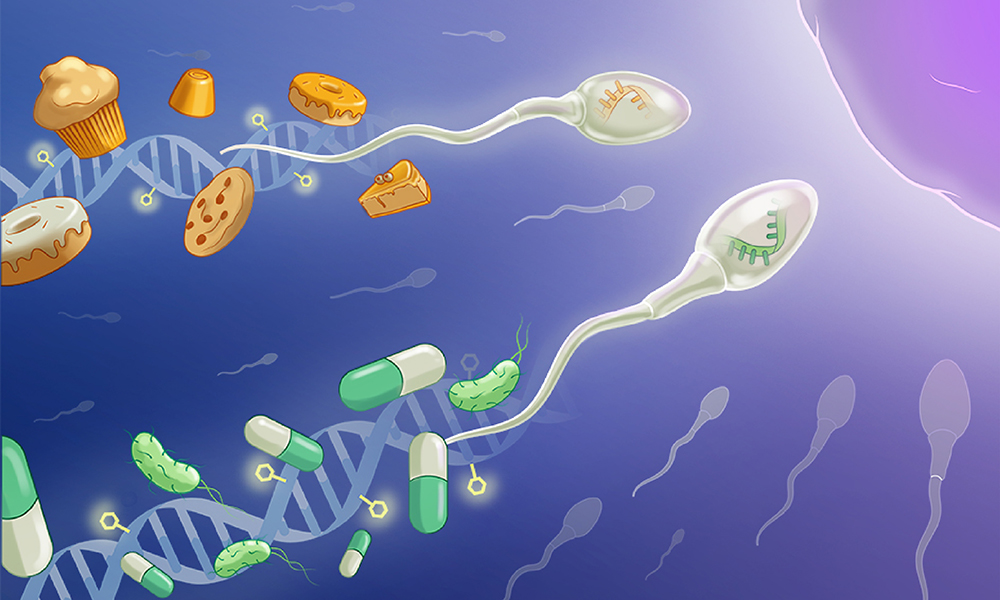A novel study from EMBL Rome scientists reveals that a father's preconception environment can leave subtle - but detectable - molecular footprints in embryos, able to shape development and long-term health of offspring.

Summary
A collaborative team led by Ana Boskovic and Jamie Hackett at EMBL Rome explored how different paternal preconception environments influence embryonic development. Their findings revealed that:
- An imbalanced paternal gut microbiome or altered diet disrupts the expression of key genes involved in extra-embryonic tissue development or growth.
- Genetic background modulates these effects, indicating that a complex interaction between genetics and environmental influences underlies inheritance.
- Paternal age impacts offspring development at the earliest stages of embryogenesis.
Over the past few decades, growing evidence has challenged the belief that inheritance is governed solely by DNA sequences. Scientists now recognise the crucial role of epigenetic inheritance - the transmission of biological traits via chemical modifications to DNA and its associated proteins. These modifications do not alter the genetic code itself but influence how genes are switched on or off, often in response to environmental factors such as stress, diet, or drug exposure.
While the concept of maternal epigenetic inheritance is relatively intuitive - given the direct biological connection between mother and embryo during gestation - recent research shows that fathers, too, can transmit environmentally induced epigenetic changes to their offspring. However, the prevalence of epigenetic inheritance - and the mechanisms behind it - remains unclear.
At EMBL Rome, a dedicated strand of research focuses on epigenetic inheritance , drawing on expertise in designing environmental exposure models, and supported by a specialised research infrastructure for genomic editing . In particular, the Boskovic and Hackett groups are exploring how paternal environmental perturbations can trigger epigenetic changes that ultimately affect the health of the next generation.
In a recent study, the Hackett group demonstrated that disrupting the gut microbiome of male mice increases disease risk in their future offspring . On the other hand, the Boskovic group has focused on mechanisms that regulate embryonic development in response to changes in paternal diet.
A collaborative study between the two groups, now published in EMBO Journal, examined how specific paternal environments affect early embryonic development in a systematic manner and under tightly controlled genetic and environmental conditions in mice.
To induce environmental perturbations, prospective fathers were exposed to either non-absorbable antibiotics (disrupting the gut microbiota) or to a low-protein, high-sugar diet. To minimise experimental variability, the analyses were performed on embryos resulting from in vitro fertilisation (IVF). Embryos were collected approximately four days after fertilisation (blastocyst stage) and individually analysed to measure differences in gene expression compared to controls (blastocysts that resulted from fathers without any treatment).
The results were striking. Both environmental perturbations led to significant changes in embryonic gene expression. Disruption of the paternal gut microbiota reduced the expression of key genes involved in extra-embryonic tissue development, while changes in the diet were linked with a modest developmental delay.
To further investigate the influence of the genetic background, scientists repeated the experiments using a different mouse strain. The outcome differed, suggesting the importance of the genetic component in shaping how environmental exposures affect offspring.
Additionally, embryos derived from older fathers showed a stronger effect on gene expression, especially on genes involved in immune-related processes, indicating that paternal age is another important factor involved in epigenetic inheritance.
"We have demonstrated that large-scale experiments are essential to untangle how specific environmental factors contribute to epigenetic inheritance across different genetic backgrounds," said Ana Boskovic. "Our tightly controlled experimental design can serve as a template for future intergenerational studies."
"Our study represents a step toward understanding the mechanism of epigenetic inheritance, particularly through the paternal line," said Jamie Hackett. "We plan to apply additional tools to investigate early changes in offspring in response to paternal environments, with the hope of paving the way for new strategies in disease prevention."
This project was carried out in the framework of the Human Ecosystems Transversal Theme - a research area defined by the current EMBL Scientific Programme - which seeks to understand the impact of the environment on human disease risk.






